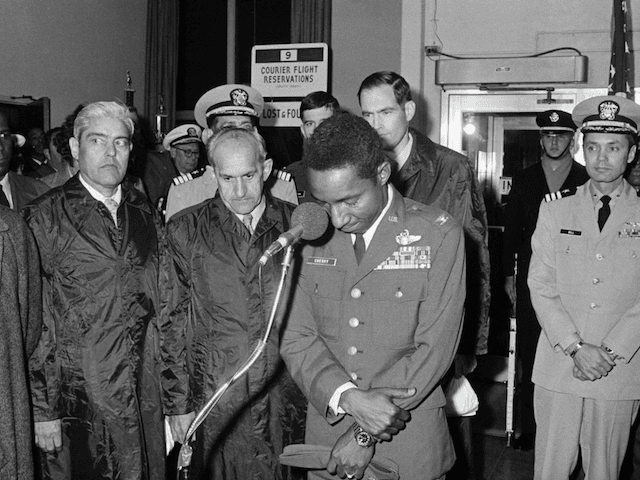Colonel Fred V. Cherry, U.S. Air Force (Ret.), the first and highest ranking black American POW of the Vietnam War, passed away this month. The Communists wanted to use him for propaganda, but he would not cooperate.
Fellow POW remembered him fondly. For example: “Once they were beating the hell out of him. They told him, ‘You’re oppressed in your country. You’re not like these white guys.’ Fred said, ‘I’m an American fighter pilot. I am just like these guys.'”
A few years ago, I had a conversation with Navy Commander Everett Alvarez, Jr. (Ret.), an American of Mexican decent and the second longest serving American POW in history. He told me that he and Colonel Cherry were treated harsher then the others because they were not white and refused to do anti-American race propaganda.
Alvarez, a Reagan Republican who explicitly rejects ethnic politics, recounts this in his 1991 book Code Of Conduct:
One of the reasons that I take a stand on ethnic matters that isn’t fashionable today is that dwelling on differences in race, skin color, national background gets in the way of cooperation. More than in any other area in American life, these distinctions are being phased out in the military, and they simply didn’t exist in the Hanoi Hilton. The damage that they can do in weakening a group or a society was well appreciated by the North Vietnamese.
He explains:
If we had let being Mexican or Italian or Black or whatever matter while we were in prison, the North Vietnamese would have splintered our group. And believe me they tried, especially working on me and Fred Cherry, a black Air Force pilot. They wanted us to feed their propaganda machine with material about mistreatment as members of oppressed minorities. For me, at least, the concept of being a minority person had never been in my head. Both Fred and I maintained that we were Americans and proud of our country, under all pressure and against all temptation, and our fellow-captives accepted us as such. It is not a position from which I will ever retreat.
(In Alvarez’s case, the North Vietnamese even brought in the Cubans to try and work him over. It may be remembered that Fidel Castro called John McCain a liar in 2008 when he spoke of a Cuban who tortured him in 1967 but, in fact, Alvarez was tortured by the same Cuban man, whom the prisoners nicknamed “Fidel”.)
The ordeal continued until the great American sleeping giant finally had enough. On December 18th, 1972, B-52s paid a visit to Hanoi. The bombing shook the earth and the walls like never before, and it continued for days. The effects are recounted by former POW and Medal of Honor winner Jim Stockdale:
The days of Mickey Mouse were over! Our wonderful America was here to deliver a message, not a self-conscious stammer of apology. “Let’s hear it for President Nixon!” went the cry from cell block to cell block, all around the courtyard.
The bombers kept coming, and we kept cheering. Guards who were normally enraged by loud talk, guards who normally thrust their bayoneted rifles through the bars and screamed at us if we dared shout during air raids, could be seen silently cowering in the lee of the prison walls, their faces ashen in the light reflected from the fiery skies above.
… For the North Vietnamese to see that … was a message in itself — proof that all that separated Hanoi from doomsday was American forbearance, an American national order to keep the bombs out on the hard military targets. We prisoners knew this was the end of North Vietnamese resistance, and the North Vietnamese knew it, too.
Within weeks, the North Vietnamese had caved in to American demands for a peace settlement, and the POWs were finally sent home.
(A few years later, the Left-wing Democrats in Congress cut all assistance to South Vietnam, triggering a Communist invasion of all of Indochina, and the beginning of an era of mass refugee crisis, genocide and even use of chemical weapons by the Communists. The people of Indochina remain under brutal Communist or Communist-puppet tyranny to this day.)
During all those years, the Civil Rights movement in the United States challenged Americans to overcome race. Despite opposition from racists such as Democratic Alabama Governor George Wallace and Democratic Senator Robert Byrd, America moved closer toward a society where people were “judged not by the color of their skin but by the content of their character.” But in the prisons of North Vietnam, such a struggle was unnecessary. Our POWs had already overcome race. There were no color or class distinctions among the captives of the Hanoi Hilton. There were only Americans.

COMMENTS
Please let us know if you're having issues with commenting.